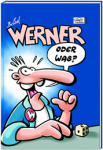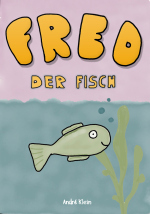André Klein's Blog, page 14
February 9, 2015
10 Strange & Funny German Signs – Can You Make Sense of Them? [QUIZ]
Have you ever been to a country where people speak a foreign language and tried to make sense of the strange sounds and signs around you? It’s actually a fun and effective way to learn a language. But we don’t always have the opportunity to do that.
This is why, today I’ve collected 10 totally strange and funny German signs for you to simulate that moment of wandering through a German-speaking environment and going “Wha…?”.
Ready? Let’s go!
1. What’s the angle?

by axel magard
Parking for anglers only. Fishing is not allowed.
Parking for fishes only. Anglers are not allowed.
Parking for anglers only allowed while fishing.
*Schongewässer: waters in which fishing is prohibited
2. What’s being stored here?

by ingoism
sea urchins
sea lions
seaweed
*Zwischenlager: interim storage (facility)
3. Due to a “wild boar issue”, please …
A photo posted by @jula_silber on Jan 19, 2015 at 1:51am PST
close the windows!
close the gates!
shoot the boars!
4. Parking at your own risk, …

by ingoism
Daft lavender!
Roof avalanche!
Roof lava!
5. What’s strictly forbidden in these hours?

by Anele
smoking
woodworking
clogs
6. “Don’t pee! …”, this sign says. Why not?
A photo posted by Froed (@schniepi3000) on Jan 26, 2015 at 4:06am PST
“Behind the door children are playing on the floor.”
“Behind the door children are forbidden.”
“In front of the door children are playing on the floor.”
7. In the beach and port area of Altefähr …
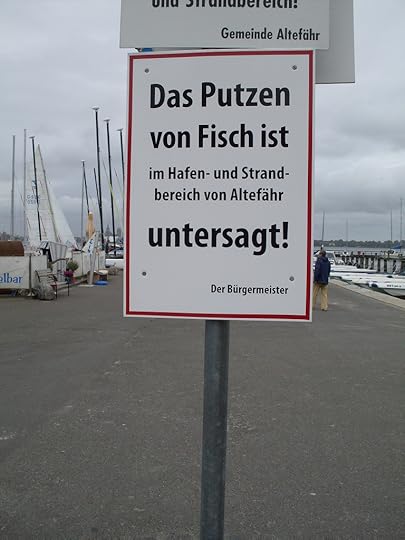
by TBErfurt
talking to fish is not encouraged.
posing with fish is recommended
cleaning of fish is forbidden.
8. No trespassing!

Every 3rd person will gain entry. 2 have already tried!
Every 3rd person will be shot. 2 have already been here.
Except in groups of 3, but never 2!
9. But what are they changing into?

by j_ortner
Attention! Change of rabbits
Attention! Change of wheat
Attention! Change of deer
10. Here you can find a … restroom*!

by ingoism
new
nerdy
nice
*that broadcasts mixed messages

 About the author:
André Klein was born in Germany, has grown up and lived in many different places including Thailand, Sweden and Israel. He has produced two music albums, performed and organized literary readings, curated an experimental television program and is the author of various short stories and non-fiction works.
About the author:
André Klein was born in Germany, has grown up and lived in many different places including Thailand, Sweden and Israel. He has produced two music albums, performed and organized literary readings, curated an experimental television program and is the author of various short stories and non-fiction works.
The post 10 Strange & Funny German Signs – Can You Make Sense of Them? [QUIZ] appeared first on Learn Out Live!.




December 12, 2014
Learn German With Comics: A Brief Introduction To German (Web) Comics
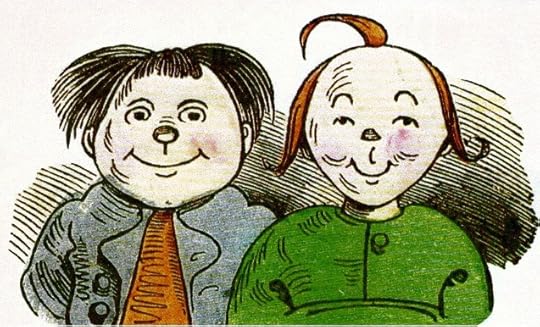
Is Max & Moritz, published in 1865, the original German comic?
Learning a language, any language, is hard. Especially when it comes to learning German, with all the endless grammar rules and exceptions, you’ll need to find ways to make your language study fun. And comics can be a great way to practice your text comprehension skills.
Here are three reasons why comics are great language learning tools:
They don’t whack you over the head with walls of text.
You can use the images as comprehension clues.
Because they’re short, you can get a quick sense of achievement
German comic culture is very different from the one found in America or France, for that matter. If you’re looking for a German equivalent of Batman and Superman, for example, chances are you’ll come away empty-handed. What many people don’t know, though, is that Germany has a long and rich tradition of cartoons and caricatures. Already in the 19th century, artists like Wilhelm Busch, author of Max und Moritz, and Rodolphe Töpffer from Switzerland were publishing their first comic strips. Imported by German immigrants, these early comic pioneers later influenced the development of the American comic strip in the Sunday papers.
In this blog post, I’d like to share both a few German classic comics and a selection of contemporary web comics.
CLASSIC GERMAN COMICS
Nick Knatterton

img via Wikipedia
Drawn by Manfred Schmidt, Nick Knatterton is a German comic from the 50s about a private eye, sporting a Sherlockian green plaid overcoat, cap and pipe.
According to the author, this comic was originally intended as a parody of the American Superman-comics. Filled with political side jabs and innuendo, Nick Knatterton is a great mirror of post-war Adenauer Germany.
On this French site, you can get an idea about the narrative and illustrative style of this comic. Some of the paperback and hardback editions are available via Amazon.
Jimmy das Gummipferd

img via comicguide.de
Another popular German comic from the 50s is Roland Kohlsaat’s Jimmy das Gummipferd, a story about an inflatable rubber horse and his rider Julio, a plump Gaucho. The comic was published weekly as part of the German Stern magazine and was later renamed “Julios abenteuerliche Reisen”. It enjoyed huge popularity well into the 70s.
On this site you can find a few scans of the original comic. A reprint of the original weekly comic was issued in 2003 and is available via Amazon (much easier to find and cheaper on the German site).
Fix und Foxi
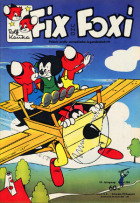
img via kaukapedia
Fix und Foxi by Rolf Kauka is a very popular children’s comic. The often formulaic series about two foxes was published for more than 40 years between 1953 and 1994. Re-launched as Fix & Foxi it ran again as a monthly magazine in 200, 2005 and 2010.
These comics are availabe via Amazon, iTunes and many other sources. At Rolf Kauka’s Fix & Foxi-Club there used to be some comics you could read online, but their site is currently under construction. Use Google Image Search for some impressions.
Käptn’ Blaubär (and other Moers Comics)

img by honk.de
Walter Moers, one of the best-known and most succesful German comic authors, created many comics for adults, such as Das kleine Arschloch (the little arsehole), a comic about an irreverent little boy, or Adolf, die Nazisau (Adolf, the Nazi pig), a sarcastic interpretation of Adolf Hitler living in today’s world.
Beside these often controversial stories he also created the more family-friendly Käpt’n Blaubär, a comic about a sea-fairing blue bear that first appeared in 1990 with the Ravensburger publishing house. The original comic was called Käpt´n Blaubärs Seemannsgarn and the character has since enjoyed great popularity on TV, in books and other media.
You can find many Moers comics (and his novels) on Amazon. Here are some samples from Käpt’n Blaubär (they seem to be drawn by a different artist, after Moers sold the rights.)
Werner
Another comic that should be mentioned here is Werner, a series by Brösel (Rötger Feldmann) about the same-titled protagonist, an unemployed biker whose two big interests in life are motorbikes and consuming copious amounts of beer. Over 10 million books have been sold and the movies based on the books have been a great success as well.
You can get some of the comics on Amazon. Here’s a sample I found by googling.
Web Comics: The Next Generation
Now that we’ve looked at a few classic German comics, let’s jump back into the present. Comic culture is alive and well in Germany, and when it comes to online web comics, it just makes it so much more accessible for readers worldwide. Some of these comics are more well-known, others more obscure, but there’s such a big variety, that every learner will be able to find something that suits his or her tastes.
So, without further ado, here’s a small collection of web-comics:
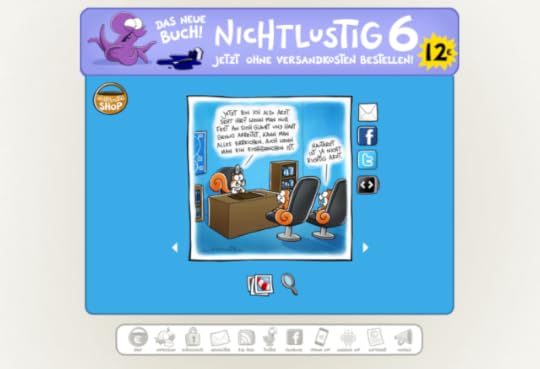
Nicht lustig (not funny) is the brainchild of Joscha Sauer, who, since 2000, has been publishing a great part of his comics for free on his website nichtlustig.de, which has quickly become one of the most popular German web comics.

Flix is a comic artist from Berlin who has published various graphic novels and comic books. His comics have appeared in many notable German newspaper. On der-flix.de he regularly publishes new short comic strips.

Ralph Ruthe, comic artist, director and musician began drawing comics for the German MAD magazine in 1998. On his website ruthe.de you can read many of his comics for free (check out the archive).
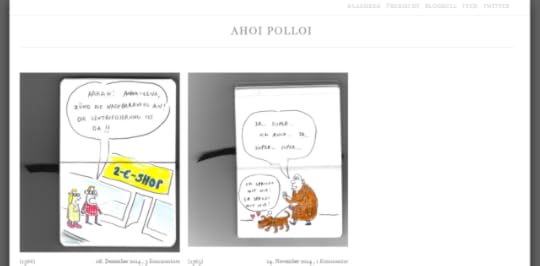
There doesn’t seem to be much information out there about the mastermind behind Ahoi Polloi, but these scans of hand-drawn comic strips have a very unique style and sense of humor. Every few days new ones appear and this site is always worth a visit.

Katz & Gold is an artist duo founded in 1996, consisting of illustrator Stephan Katz and writer Max Goldt. Their comics appear regularly in German satire magazine Titanic and Die Zeit. On their site katzundgoldt.de you can find selected works and hilarious t-shirts.

On medi-learn.de you can find many comics about medicine, rescue service, fire fighters and other topics. These comics may be especially interesting for medicine students, but many of them are still understandable without much precursory knowledge.
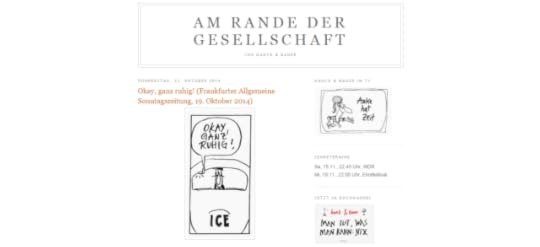 Am Rande der Gesellschaft (at the edge of society) is a comic by Elias Hauck and Dominik Bauer whose works regularly appear in the Frankfurter Allgemeinen Sonntagszeitung, Titanic and on Spiegel Online. On hauckundbauer.blogspot.de you can find their latest comic strips.
Am Rande der Gesellschaft (at the edge of society) is a comic by Elias Hauck and Dominik Bauer whose works regularly appear in the Frankfurter Allgemeinen Sonntagszeitung, Titanic and on Spiegel Online. On hauckundbauer.blogspot.de you can find their latest comic strips.

Beetlebum is a webcomic about science fiction, gaming, internet culture and daily life. It’s the brainchild of Johannes Kretzschmar, a PhD student in the research field of artificial intelligence.

Groobert’s Comicversum is a very unique webcomic by Robert Mühlich which is about nothing more and and nothing less than the story of our universe, from the beginning until the bitter end.
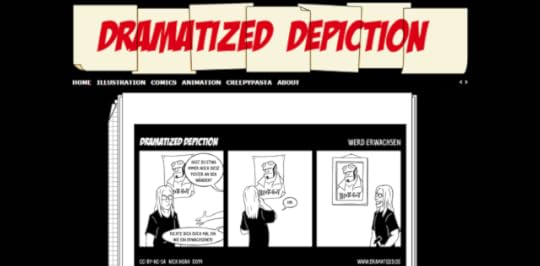
Dramatized Deception is an autobiographical comic by Nick Noah, filled with true and fictitious moments from the author’s life, and sometimes just silly puns or parodies.
Even More German Comics …
Still can’t get enough of German comics?
On webcomic-verzeichnis.de (webcomic directory) you can find an exhaustive list of German webcomics. They even have an RSS feed so that you can plug a never-ending stream of German comic goodness straight into your brain.
Another great site for German comics is mycomics.de. There you can find tons of free comics uploaded by community members. They differ in style and quality, but it’s definitely worth exploring.
Last but not least, the Goethe Institut has a great site about German comics where you can learn about the history of the German comic, classic and contemporary artists and much more.
-

 About the author:
André Klein was born in Germany, has grown up and lived in many different places including Thailand, Sweden and Israel. He has produced two music albums, performed and organized literary readings, curated an experimental television program and is the author of various short stories and non-fiction works.
About the author:
André Klein was born in Germany, has grown up and lived in many different places including Thailand, Sweden and Israel. He has produced two music albums, performed and organized literary readings, curated an experimental television program and is the author of various short stories and non-fiction works.
The post Learn German With Comics: A Brief Introduction To German (Web) Comics appeared first on Learn Out Live!.




December 2, 2014
7 Untranslatable German Words
One of the great things about learning a new language is that you gain access to a whole new range of words that don’t exist in your mother-tongue, boiling certain concepts down to an essence. German is infamous for having a lot of words which are untranslatable, or at least difficult to translate, such as Schadenfreude, Zeitgeist, Wanderlust and other popular compound nouns which were happily adopted by English and other languages. In short, if “there’s an app for that”, there’s probably a German word as well. Here are seven of them:

1. Das Fernweh (noun)
Components: Ferne (distance) + Weh (pain, yearning)
Fernweh describes the yearning for foreign lands, the desire to travel. It’s what happens when there’s Wanderlust (itchy feet) but perhaps no opportunity to actually wander. All there’s left is yearning, pining for unknown distances. Think of staring through windowpanes on rainy afternoons, dreaming of blue seas and deep jungles. This word is the counterpart to Heimweh, which means homesickness. So, by implication, one could say that Fernweh describes a kind of homesickness for places you’ve never been to.
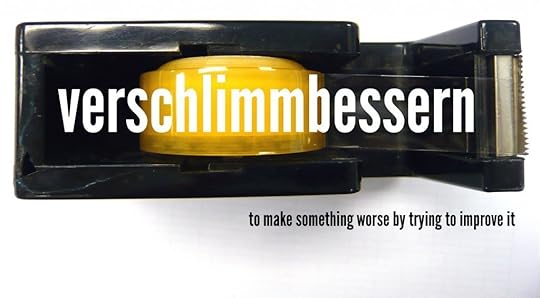
2. verschlimmbessern (verb)
Components: schlimm (fatal) + verbessern (improve)
This German verb describes the attempt to improve or repair something and only making it worse in the process. Think of repairing bicycles and nuclear submarines with Scotch® or selltotape® (in German we call it Tesa®, by the way). Whether “Trust me, I’m an engineer” or “There, I fixed it”, these memes can all be summarized with this beautiful German verb. And it doesn’t just refer to honorable but futile DIY endeavors. For example, when a students receives and essay crawling with spelling errors and — being asked to correct it, just adds insult to injury, that’s also a case of Verschlimmbesserung, which would be the corresponding noun.

3. Torschlusspanik (noun)
Components: Tor (goal, gate) + Schluss (end, closing) + Panik (panic)
It’s the eleventh hour. The gates are closing. This German noun describes a kind of “last minute panic” which appears when you’re afraid to miss out on something, especially — in relationships — the fear of being unable to fulfill certain wishes due to aging, like having children. The origins of this noun date back to medieval times where city gates were closed at dusk to protect its dwellers from robbers and wild animals. If you didn’t make it inside on time, you either had to sleep outside or pay a fee to regain entry.

4. Die Schnapsidee (noun)
Components: Schnaps (booze) + Idee (idea)
This German noun describes the kind of idea that seems brilliant after a couple of drinks and in the morning — if acted upon — may lead to ridicule, shame and self-reproach. Obviously, there are many people who frequently come up with these kinds of ideas without ingesting even a single drop of alcohol. But the concept is the same: some ideas are so terrible that they could only have been dreamed up in a drunk stupor.

5. Die Fahne (noun)
Components: Fahne (flag)
This “flag” is usually not the kind that is being hoisted with pride. It’s invisible, and whoever’s flying it may not even be aware of its existence. In many cases, it can actually be a red flag, indicating to coworkers and family members that someone in their vicinity may have a drinking problem. Also known as Alkoholfahne or Schnapsfahne, this German noun describes the smell of alcohol on a person’s breath. Sometimes this word is also used to describe other kinds of bad breath, like a Knoblauchfahne (garlic breath) for example.

6. Der Schilderwald (noun)
Components: Schilder (signs) + Wald (forest)
This species of forest favorably grows around busy intersections and in concrete jungles. Street signs are usually put up to help us navigate, but when there are so many that we miss the forest for the trees, we might be dealing with a Schilderwald. And if you’ve ever driven on a German road, you will know that, like everything in Germany, traffic is highly regulated and comes with a seemingly endless variety of — to the uninitiated often esoteric street signs, especially when it comes to Vorfahrtsrecht (right of way).

7. Der Warmduscher (noun)
Components: warm (warm, hot) + Duscher (person taking a shower)
What could be so bad about taking a warm shower? Do real men only bathe in ice-water? Often used ironically, this German swear word describes a person which is believed to be weak or cowardly. It gained popularity in the Football World Cup of 1998 when comedian Harald Schmidt applied it to some players, which apparently the German Football Association didn’t find so funny and sued. More interestingly perhaps, this word led to a language-wide search for synonyms. Among these were words that all ironically decry a generally acceptable, or at least understandable behavior, such as Balkonsonnenbader (person who sunbathes on a balcony), Wanderkartenfalschfalter (person who folds hiking maps incorrectly) or Wattebällchenkegler (person who bowls with cotton balls). See more here or here.
-
images: by morguefile.com

 About the author:
André Klein was born in Germany, has grown up and lived in many different places including Thailand, Sweden and Israel. He has produced two music albums, performed and organized literary readings, curated an experimental television program and is the author of various short stories and non-fiction works.
About the author:
André Klein was born in Germany, has grown up and lived in many different places including Thailand, Sweden and Israel. He has produced two music albums, performed and organized literary readings, curated an experimental television program and is the author of various short stories and non-fiction works.
The post 7 Untranslatable German Words appeared first on Learn Out Live!.





November 20, 2014
Why You’ll Never Get The German Sense of Humor Unless You Learn the Language

Have you ever heard the saying that Germans have no sense of humor? Well, it’s a fairly widespread belief. In a 2007 study more than 30,000 people in 15 countries were asked to rank the world’s countries with the worst sense of humor. Guess which country earned the title of “Unfunniest Nation”? Yeah, you guessed it …
But wait a second! Do Germans really have no sense of humor? Or have we all just seen too many American WWII movies featuring stiff-lipped soldiers shouting and grunting in monosyllabic splendor? Perhaps the German kind of humor just doesn’t translate well?
Lost in Translation
Language and humor are closely linked. Since the German language works very differently from English, especially when it comes to building new words and constructing sentences, humor expresses itself in a way which is often terribly difficult to translate.
German is full of often unintentional humor due to linguistic ambiguity. Let’s take a look at an example. The following sign advertises a trial course for policemen about the topic of cocaine.

Not funny? Well, you have to know that the word for “trial course” which is being used here — der Schnupperkurs — translate literally as “sniffing course”. Of course, now that the joke has been explained, it’s dead.
Another good example, also dealing with law & order, is this one (via Wikipedia):
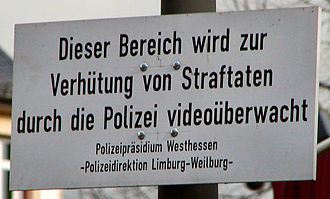
The sentence says: “This area is under video surveillance by the police to prevent crimes.” Nothing too funny about that, but due to German syntactical ambiguity, it can also be understood as “This area is under video surveillance to prevent crimes committed by the police.”
German news magazine Der Spiegel has a whole category devoted to these unintentionally humorous sentences. Trying to read these short snippets and headlines can be a great way for advanced students to take their German to a whole new level.
Now that we’ve established that Germans don’t necessarily lack a sense of humor, but perhaps we just to need to hone our sense of German to understand it, let’s take a look at some of the most well-known and well-beloved German comedians.
Classic German Comedians
Loriot
I’ve already written about Loriot here, one of the grand-masters of a very typically German kind of humor. You can find a number of videos from his self-titled TV show on YouTube, some of them even with English subtitles. Here’s a scene about the wonders of married life. Since it consists of very simple sentences, it’s a great way for beginners to get a feeling for the language.
Helge Schneider
There’s probably not a single comedian who divides the Germans like Helge Schneider. There are those who love him, and those who hate him. His humor is in some ways very anarchic, but in other ways relies heavily on linguistic intricacies, which are often unfathomable to non-natives. The following dialogue between a teacher and a student will give you a quick taste.
Otto Waalkes
Another famous classic German comedian goes by the name of Otto Waalkes. Like many German comedians, his approach to humor is shaped by the dialect and mentality of his origin. Hailing from the cool, detached north, Otto is well-known for his fictitious (and utterly nonsensical) English lessons:
More German Comedians
Since regional varieties play a big role in German language and humor, many famous comedians are intrinsically linked to their dialects. If you’re curious how different German dialects sound and how humor is expressed differently in these varieties, these comedians are a good place to start.
 Gerhald Polt
Gerhald PoltComedian: Gerhald Polt
Region: South (Bavaria)
Dialect: Bavarian
 Badesalz
BadesalzComedian: Badesalz (duo)
Region: Central West (Hesse)
Dialect: Hessian
 Gerd Dudenhöffer
Gerd DudenhöfferComedian: Gerd Dudenhöffer, aka Heinz Becker
Region: South West (Saarland)
Dialect: Rhine Franconian
-
Germany maps by David Liuzzo CC

 About the author:
André Klein was born in Germany, has grown up and lived in many different places including Thailand, Sweden and Israel. He has produced two music albums, performed and organized literary readings, curated an experimental television program and is the author of various short stories and non-fiction works.
About the author:
André Klein was born in Germany, has grown up and lived in many different places including Thailand, Sweden and Israel. He has produced two music albums, performed and organized literary readings, curated an experimental television program and is the author of various short stories and non-fiction works.
The post Why You’ll Never Get The German Sense of Humor Unless You Learn the Language appeared first on Learn Out Live!.





October 24, 2014
What’s The Best Software For Writing Ebooks? – A Brief Introduction

Some rights reserved by mpclemens
Once you’ve made the decision to write your first ebook and self-publish it or just finally release that epic fantasy tome catching dust in your drawer, the inevitable question arises: what’s the best software for this? How much should you spend? Is there something open-source, perhaps? Can you just use good ol’ Word?
Since I’ve been asked this question many times in the past, I’d like to share a few key aspects which may be important in finding the right answer to this question, because ultimately — despite what software companies will tell you — there is no one-size-fits-all solution. Whatever works for you is best.
The Three Stages of Creating An Ebook
First of all, it’s important to realize that there are (at least) three distinct stages in creating an ebook:
Writing the manuscript
Formatting the manuscript
Converting the manuscript to ebook format
No matter which software you end up using, you’ll have to go through all of these stages. And I think I should tell you right now: there is no software in the world that does all of that for you perfectly. There are several programs that promise to cover everyhing, but in my experience they all have shortcomings when it comes to more complex formatting and layout.
Instead of hunting for the magical super solution (which probably doesn’t exist), I recommend to find a tool for each of these stages that a) you feel most comfortable with and b) fulfills all the needs for your production.
1. Writing The Manuscript
When it comes to the actual writing part of your ebook production, there are two key things to have in mind:
Write wherever you feel most comfortable writing
You could use Microsoft Word, an open-source alternative like Open Office or some minimalist writing tool. For all I know, you could even start writing your book in Notepad, some web app like Noisli or Google Drive. In short, it really doesn’t matter where you write, as long as the software makes you want to write. Personally, my writing software of choice is WriteMonkey, because it hides everything else on screen beside the actual words, but that’s just me.
Ignore the formatting (yes, really!)
While you’re just sitting there whacking away at your keyboard, you really shouldn’t worry about things like typefaces, font-sizes, margins, colors and so on and so forth. Just focus on writing the actual text, word by word, sentence by sentence, paragraph by paragraph. Why? It keeps you from getting entangled in esoteric menu-bars and formatting icons, plus it makes converting your manuscript so much easier when you’re done.
If you’ve ever used formatting styles, you may want to add some headline styles for creating a rough structure already at the manuscript stage, but you could also just mark headlines in a different way and add styles later. It depends a bit whether you’re working on a novel or a non-fiction work, which tends to be more complex in terms of formatting and structure. At any rate, if you have to do some formatting at this stage, at least keep it as simple as possible.
2. Formatting Your Manuscript
Now, let’s add a bit of structure and formatting to our manuscript. These are only some broad guidelines. You can find more details here.
Copy and paste, formatting-free
As for the formatting, you can just use a software like Microsoft Word, Open Office or InDesign, depending on what you feel comfortable working with. The only requirement at this stage is that it should support styles. Simply copy and past your (hopefully formatting-free) manuscript into a new document. If your manuscript isn’t formatting-free, or you want to troubleshoot complexities, use a tool like PureText to copy and paste without the formatting.
Tentatively start adding styles
Once you’ve got the whole text in your word processing software, start adding styles. Don’t go overboard with colors, font-sizes, margins and typefaces just yet. Try adding a few headline styles first of all. Save it. Then do a test-conversion. If it’s all fine, go back, add some more styles and try again.
3. Converting Your Manuscript
Now, this is where things can get a bit tricky, but they don’t have to. Depending on a) the complexity of your structure and formatting and b) which ebook formats you’re trying to generate (MOBI/AZW for Amazon, .EPUB for iBooks, Smashwords, Kobo, etc.) you might have to resort to a bit of trial and error at this stage.
Convert the manuscript
There are many ways to convert your manuscript and preview the ebook. The most well-known tool is probably Calibre. It allows you to convert a number of different text formats to a number of different ebook formats. I’ve found to get the best results while using HTML as an input format.
This is the most technical aspect of this process, but it’s not impossible to learn. If you already know how to use Word, this is not much more difficult. I’ve written a more detailed tutorial here.
Preview the ebook
Once your ebook file is complete, preview it on an e-reader, tablet, phone or e-reading software. If you’re aiming for Amazon, the Kindle Previewer is a great little tool. When it comes to EPUB files, an essential tool for previewing, troubleshooting and fixing things is Sigil.
Compromise Vs. Control
If all of the above seems daunting, you may want to take a look at Scrivener. It wants to be the place where you plan your book, write it, format it and convert it, all in one place. It does a lot of things, and comes with its own learning curve. Personally, I’ve tried it and found it too cluttered and felt boxed-in, but that’s just me.
In the end it’s all a matter of control. The more of it you relinquish to software, the more compromises you face. I believe that by using different tools for different stages of the ebook production process, you get a lot more control. It will take some time to learn, but you are not alone. Most questions can be answered by a simple Google search.
I hope you’ve found this short overview helpful. Happy writing and publishing!
-

 About the author:
André Klein was born in Germany, has grown up and lived in many different places including Thailand, Sweden and Israel. He has produced two music albums, performed and organized literary readings, curated an experimental television program and is the author of various short stories and non-fiction works.
About the author:
André Klein was born in Germany, has grown up and lived in many different places including Thailand, Sweden and Israel. He has produced two music albums, performed and organized literary readings, curated an experimental television program and is the author of various short stories and non-fiction works.
The post What’s The Best Software For Writing Ebooks? – A Brief Introduction appeared first on Learn Out Live!.





October 10, 2014
10 Ways To Find Simple German Texts and Stories For Beginners Online

img by Found Animals via FlickR (CC)
Reading can be a great way to learn a language, but it’s not always easy to find texts which are both simple and interesting enough, especially for beginners.
When you ask people for easy-to-read German texts, they will often recommend children stories, or books for young adults. That’s a great idea, but not everyone will want to read about pink giraffes and vampire drama all day long.
You could also try reading some German short stories or relatively simple novels, but for absolute beginners it can be daunting, so today I’d like to show you another source for easy-to-read German texts.
Say it Plain And Simple
It’s funny. German is a beautiful language for expressing scientific concepts, literary notions and philosophical ideas, but saying simple things can often become very complicated. If you’ve ever tried translating English to German you may have noticed that the German text is often double as long as the original.
To say it with Mark Twain, the “mastery of the art and spirit of the Germanic language enables a man to travel all day in one sentence without changing cars“. He’s right. Sentences can ramble on and on, and when you finally reach the verb (which is conveniently positioned at the end) it can be tricky to remember what it even referred to.
This is not just a problem for language learners, mind you. Many German native speakers are struggling with their own language as well, especially when it comes to certain grammar distinctions (Dative vs. Genitive, als vs. wie, etc.) or the horribly contrived Bürokratendeutsch of forms, contracts and other legal documents.
For a while now there have been initiatives to simplify German, in order to make it more accessible for both non-native speakers and natives with cognitive or physical limitations. This new simplified German is called Leichte Sprache (literally: light or simple language) or Einfache Sprache (easy language).
Germans being German, Leichte Sprache has its own detailed compendium of rules and regulations, such as:
Only short sentences are being used.
Each sentences contains only one statement.
Only active-sentences are being used.
Sentence structure is simplified to: Subject, Predicate, Object.
Genitive is avoided.
etc.
Leichte Sprache is less regulated and more similar to the English concept of “plain language”, but the idea is the same: reducing language complexity in favor of accessibility.
How To Find Simple German Texts
There are a number of places online where you can get simple German texts. Here’s a small selection:
Simple German News

On the Nachrichtenwerk you can find very simple news articles and other texts in the three categories of “Kultur”, “Sport” and “Nachrichten”. The site is updated very frequently and has new relevant texts on a daily basis. The texts are even simplified visually, so that each short sentence occupies its own line.

Another site that offers similarly simple texts about daily events and other topics is this service by the Deutschlandfunk. The layout is very clear and you can even get the short articles read out loud to you by clicking on the audio icon. Also, under each article, important concepts mentioned in the text are explained in easy German.
Simple German Articles & More
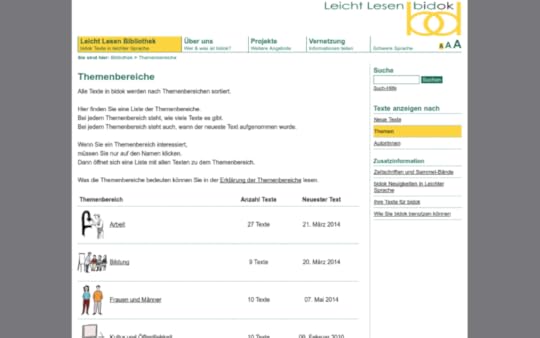
This site offers a library of simple German texts about a variety of different topics, such as work, education, life, politics, law and others. The texts themselves are presented in a simplified layout, as well, with single lines, generous line-spacing and illustrations.
This project is called Offene Bibel (open bible) and is a collaborative effort aimed at producing a complete translation of the bible in various modern alternatives. The Leichte Sprache edition is a work in progress and many chapters are still missing, but if you ever wanted to read this classic text in German, this might be a good way to start.
Fußball-Regeln in Leichter Sprache
This little PDF booklet will explain everything you need to know about football in plain and simple terms, including the often-explained but rarely-understood Abseits (offside).
A Dictionary in Simple German

You know that feeling when you look up a word and the definition is even more complicated than the word itself? Follow the link above to find a free dictionary written in simple German. Sure, you could always just translate words to English or your native language, but actually looking up the definitions in an easy-to-read way can be a great practice in and of itself.
Simple German Stories
sos-halberstadt.bildung-lsa.de
Don’t be deterred by the first impression of this site. There’s a lot of content here. This site is a real treasure trove of legends, fairy-tales, ballads and other stories in short and concise German, originally published as a textbook series for hearing-impaired children in the GDR. Personally, I especially recommend the “Schwänke” (droll stories) category where you can find many of the traditional Eulenspiegel and Schildbürger prankster stories. All texts come as PDF with illustrations.
If you’re looking for longer reading material, the Spaß Am Lesen Verlag publishing house has specialized in producing translations of popular classics into simple German, such as Wir Kinder vom Bahnof Zoo or Im Westen Nichts Neues. The books are only available as paperback editions, but you can read the first few chapters for free by clicking on the blue link at the bottom of the product pages.
If you’re looking for even more simple stories for German learners, you can also take a look at our very own German learning library. There are murder mysteries, interactive fantasy stories, short comedy travelogues and more. All books are available as ebooks and paperback editions and come with a short German-English dictionary, illustrations and short comprehension exercises.
visit our German stories library »
-

 About the author:
André Klein was born in Germany, has grown up and lived in many different places including Thailand, Sweden and Israel. He has produced two music albums, performed and organized literary readings, curated an experimental television program and is the author of various short stories and non-fiction works.
About the author:
André Klein was born in Germany, has grown up and lived in many different places including Thailand, Sweden and Israel. He has produced two music albums, performed and organized literary readings, curated an experimental television program and is the author of various short stories and non-fiction works.
The post 10 Ways To Find Simple German Texts and Stories For Beginners Online appeared first on Learn Out Live!.





October 3, 2014
What Ambitious Parents Can Teach You About Freelancing

Believe it or not: Not all of these are your customer
When I first started with Fluent Language Tuition, I had no idea where the whole experiment was going to go. I was so hesitant to consider this a real business that I tried to hide my name from the website, the flyers and all business cards. My brand was not a consideration in those days, and I took all the work that was on offer. The following story shows just how wrong that whole approach can go.
A few years ago, I responded to an ad from a local family whose kid wanted language tuition. It seemed like a perfect opportunity: a keen young learner, solvent parents, an international background and a desire to get into a great private school. And they were local! I was excited about this great opportunity, my mind’s eye wandering to groups of school kids finding fun in learning with me. I turned up at the family’s home on a rainy day, ready to talk about how we were going to do this thing. Instantly, our energy levels were entirely different. My enthusiasm and positivity met with their polite and measured manners. I sat with the family in their living room for an awkward hour, nibbling politely on a biscuit and hearing about the previous tutor. They seemed to want someone who can impart the knowledge of the world on junior: three languages, British history, art projects, school work oversight, and exam preparation.
This is where alarm bells should have sounded, but for a bright-eyed newbie like me there was no stopping.
With this being my first opportunity for teaching someone in a formal education environment, I felt compelled to say yes. Sure, this was a tall order but I’m not someone who recoils at the first sign of a challenge. I was going to make these next lessons awesome! In the next days, I put hours of work into planning a course of suitable lessons, setting up a schedule, emailing them a full calendar template and planning out the next three months. I was ready to rock. What I had completely ignored is that this traditional, achievement-focused and formal family really did not want any rockin’ at all. My first lesson with the kid was supervised by both parents. I had specially studied up to compensate for my lack of knowledge about Henry VIII, and came in bringing creative new methods. The lesson went fine, a full hour trying to marry my carefree, experience-focused style with the formal expectations of my client. In my heart, I could tell that I wasn’t getting it right, but I was not ready to give up. Three days later, the family emailed me to let me know they were not going to proceed in working with me as a tutor.
Looking back on the situation from where I am now, I can tell that this was never going to work. In fact, these clients did me a huge favour by cancelling the service as early as they did because it would have just caused me nothing but grief. My teaching style is not suitable for people who need expertise in many school subjects at once, and especially not when you are looking for instant results. Instead, I take the time to bond with my client and talk to them directly. Focusing on the child and not the parents did me no favours. So what was it that pushed me to work with someone I really had no business working with?
How to Avoid Making the Same Mistake
In my years as a language tutor, I have had to realise that I’m not perfect for every type of client. My style is not suitable for every learner, and instead I have found that both my energy and motivation and my learner’s happiness are much stronger if I stay within my “happy zone”.
As you start out in your journey towards finding the ideal client, you might experience the same feelings — a desire to follow the money is a telltale sign that you don’t have a clear plan yet. Working with the ideal student means you are happy being yourself, and they’re even happier being with you. These are the people that love your ideas, your energy and your style. And perhaps more importantly, the ones that will pay you, then thank you, and then recommend you.
For more information about how to build a great teaching plan, check out the teachers page at Fluent. And remember: It’s not WHAT you teach, it’s WHO you are and WHO is learning that counts the most.
-
You’ve been reading a guest post by Kerstin Hammes

Kerstin Hammes is a native German speaker and has lived in the UK since 2003. She’s passionate about languages and has studied English, French, Italian, Latin, Spanish and Russian. Kerstin is the lady behind Fluent Language Tuition and teaches students of German, French and English as a Foreign Language as a tutor and coach. You can say hello to her on Twitter, Facebook and Google+

 About the author:
Kerstin Hammes is a native German speaker and has lived in the UK since 2003. She’s passionate about languages and has studied English, French, Italian, Latin, Spanish and Russian. Kerstin is the lady behind Fluent Language Tuition and teaches students of German, French and English as a Foreign Language as a tutor and coach. You can say hello to her on Twitter, Facebook and Google+
About the author:
Kerstin Hammes is a native German speaker and has lived in the UK since 2003. She’s passionate about languages and has studied English, French, Italian, Latin, Spanish and Russian. Kerstin is the lady behind Fluent Language Tuition and teaches students of German, French and English as a Foreign Language as a tutor and coach. You can say hello to her on Twitter, Facebook and Google+
The post What Ambitious Parents Can Teach You About Freelancing appeared first on Learn Out Live!.





September 28, 2014
How To Watch German TV Online In Your Browser Or Mobile Device

photo by Stef Ming via CC license
Learning German with apps and self-study textbooks is a great way to start, but after a while translating isolated sentences and stuffing your brain with flashcards and grammatical explanations will not be enough anymore. Whether you start looking at German children’s books, easily written short stories or German novels, eventually you’ll have to expose yourself to more real-world German.
If you’re not the reading type, you can also learn German with on-demand TV series, German movies, or — as I’d like to show today — by watching German television channels.
A Brief Introduction To The German TV Landscape
In general, German television channels can be categorized within these two groups:
1. Öffentlich-rechtliche Sender (public service broadcasters)
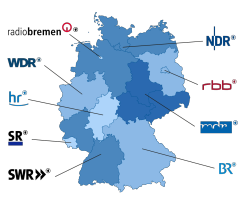
img via Wikipedia / license: Creative Commons Attribution-Share Alike 2.0 Germany
There are two big national German TV stations: ARD and ZDF. In addition to these, there are a variety of local or regional channels. All German public service broadcasts are funded through license fees paid by German viewers. Due to the non-commercial nature of these channels, you’ll find little to no advertising and a programming schedule which aims to share meaningful content instead of just whatever gets the most eyeballs.
See the map for a quick overview of the regional channels. (Hint: The R always stands for Rundfunk, the German word for broadcast, so you get Westdeutscher Rundfunk, Südwestrundfunk, Norddeutscher Rundfunk, etc.)
2. Privatsender (commercial broadcasters)
Whereas the public service broadcasters mostly focus on qualitative journalism, nature documentaries and other family-friendly programming, commercial broadcasters take care of the rest: dubbed blockbuster movies and TV series, cartoons, dubious talk shows, and a host of Spartensender (special-interest stations).
Well-known German private channels are RTL, Sat 1, Pro 7, Kabel Eins, Viva, VOX, N24 and many others.
For a complete list of German television channels (both public and private), see here.
How To Watch German TV On Your Laptop Or Mobile Device
Now that we’ve learned a bit about the German TV landscape, the obvious question is: how and where to watch? Sure, if you live in German you can just turn on the TV, but many German learners are living abroad, so let’s take a look where and how you can access German TV streams online.
Wonderful Media Libraries, Limited Access
The ARD has an excellent media library which you can access via ardmediathek.de (also available as Android and iOS app). By clicking on the LIVE link you can watch the ARD stream and various sub-channels directly in your browser. Also in the ZDF Mediathek, which comes with an Android and iOS app as well, there’s a link to the ZDF main live stream and its three sub-channels. Another great Mediathek with live streaming option is the one by Arte, a Franco-German TV network, which you can find on arte.tv (or as Android and iOS app).
Unfortunately, some of these streams are geo-restricted, which means that there’s always a chance this won’t work in your country.
What to do? You could try to use a VPN (virtual private network) connection that will allow you to circumvent some of these restrictions. For example, I’ve found that by using unblock-us I managed to get access to the ZDF live streams while abroad (and some but not all ARD and ARTE programs).
I’ve tried accessing some of these streams with Hola, a free VPN, but unfortunately that didn’t work. So if you want direct access to the Mediathek live streams (on-demand content often works also abroad), you may have to pay a monthly fee for a VPN service or look for alternatives.
Alternative Ways To Watch German Television Online
Another great service to watch many German TV stations for free is Zattoo (Android, iOS), but also here, without a VPN the chances of actually getting the streams to work is very slim.
If you don’t want to deal with setting up VPN connections, you could also use one of the following sites and services, some of them which operate in a kind of legal grey zone. Then again, using VPNs may also be considered a legal grey zone. As always, in case of doubt, check your local laws.
schoener-fernsehen.com
On this site you can watch a number of German TV stations (both public and private) directly in your browser. The streams aren’t high quality and the sites uses ads, but apart from that it’s workable. NOTE: This service is operating in a legal grey zone, according to CHIP, because it uses peer-to-peer streaming, and with all likelihood provides these streams without permission by the stations.
filmon.com
On this site you can watch five different German TV channels (Kika, ZDF, ZDF Info, Eurosport and Euronews), free of charge, without registering. Look in the menu for German TV. Stream quality is mediocre.
LocalTV (Android APP)
With the help of this app, you can watch a number of smaller and regional public service stations. Since this apps appears to be using the official streams of German TV stations not all links worked. Apart from that, the app is great and provides fast access to German TV.
-
all information is for educational purposes only and doesn't constitute legal advice.

 About the author:
André Klein was born in Germany, has grown up and lived in many different places including Thailand, Sweden and Israel. He has produced two music albums, performed and organized literary readings, curated an experimental television program and is the author of various short stories and non-fiction works.
About the author:
André Klein was born in Germany, has grown up and lived in many different places including Thailand, Sweden and Israel. He has produced two music albums, performed and organized literary readings, curated an experimental television program and is the author of various short stories and non-fiction works.
The post How To Watch German TV Online In Your Browser Or Mobile Device appeared first on Learn Out Live!.





August 27, 2014
Never Get Lost In Our German Learning Dungeons Again With These New Maps
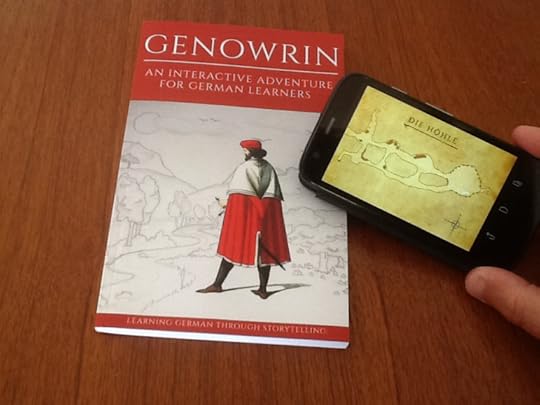
Recently, I’ve heard from some readers that they were getting lost in the mazes of Genowrin and Shanima. For those who don’t know these books, they are part of an interactive German learning adventure, where the reader has to choose one’s path through the story by jumping in between pages, selecting dialogue options and navigating through forests, dungeons and other mazes.
The navigation is based on the four cardinal directions N, O, S, W, so that from each page or tile in the maze, you can “walk” up, right, down or left. Depending on the size and complexity of each maze, it can sometimes be tricky to find one’s way. And there’s nothing more frustrating than going in circles.
If you’ve grown up playing RPGs or adventure games, you will know that in these cases it’s best to just grab a pencil and sketch out the labyrinthine paths on paper as you trudge along, marking dead-ends, crossroads and thereby slowly explore the whole maze.
Since these books are for German learners however, part of the reader’s attention will always be wrapped up in parsing the foreign syntax and new words, so some people may not want the additional “burden” of figuring out these mazes.
This is why I’ve decided to create a set of pre-made maps for these caves, forests and buildings and include them in the books, so that if you don’t like the feeling of stumbling through the dark, you just have to follow the maps. Here’s one from Shanima:

Don’t Get Lost in The Wilderness
At this point, all maps have been successfully integrated into both the paperback and Kindle editions of the two books, so there are multiple ways to use them. The maps are embedded in the books and you’ll also find download links to PDF versions at the end, so you can:
open the maps on your smartphone
open them on your Kindle (or Kindle app)
view them on your desktop computer or tablet
print out the maps (and add your own annotations)
etc.
In short, whether you choose to make your own maps or prefer to use the included ones, there’s room for lots of flexibility and I hope that this will make reading these stories much more enjoyable. If you already have the Kindle versions you can get the new edition by turning on automatic updates. If you have the old paperback edition, just send me a short note and I’ll give you an access link the maps.
-

 About the author:
André Klein was born in Germany, has grown up and lived in many different places including Thailand, Sweden and Israel. He has produced two music albums, performed and organized literary readings, curated an experimental television program and is the author of various short stories and non-fiction works.
About the author:
André Klein was born in Germany, has grown up and lived in many different places including Thailand, Sweden and Israel. He has produced two music albums, performed and organized literary readings, curated an experimental television program and is the author of various short stories and non-fiction works.
The post Never Get Lost In Our German Learning Dungeons Again With These New Maps appeared first on Learn Out Live!.





August 15, 2014
7 Strange German Superstitions And Slightly Crazy Cultural Beliefs
Every culture has their own strange superstitions. Even in Germany, which likes to present itself as a bastion of rationality, many old German superstitions are still alive and kicking. Did you know for example, that in Germany wishing happy birthday has to be timed perfectly, or that a wrongly clinked glass can ruin your love-life for many years to come?

Some rights reserved by Solo
Wishing Happy Birthday Before The Actual Birthday Brings Bad Luck
In many cultures wishing someone happy birthday before the actual day can’t do harm. It’s done preemptively, better early never never. Not so in Germany! Wishing someone happy birthday, even just a few hours before midnight is said to bring bad luck. Far from being an old lady’s superstition this is still a widely held belief, and failing to respect this tradition can upset people.
Hence, there’s a tradition of “reinfeiern” in Germany, literally “to celebrate into”, where the guest gather on the evening before the birthday and then “celebrate into” the next day, wishing their happy birthdays precisely — Germans being German — when the clock strikes midnight.

Some rights reserved by Al404
No Eye-Contact While Clinking Glasses = 7 Years Of Bad Lovemaking
Whether you clink glasses with your drinking buddies, family or colleagues, it is of paramount importance to maintain eye-contact while doing so. Eye-contact in Germany is generally considered to be very important. Failing to maintain eye-contact whether in private or business conversations can be interpreted as a sign of disrespect and dishonestly. However, when it comes to clinking glasses is is even said to cause seven years of bad sex!
The source of that superstition is not quite clear, but some sources say that it might be a remnant of medieval days when it was very common to get poisoned. Maintaining eye-contact while clinking glasses was considered to establish trust between host and guests. Perhaps the magically charged number 7 and the threat of sub-standard hanky-panky was simply thrown in for good measure to drive the point home?

Some rights reserved achichi
Lighting Your Cigarette With a Candle Causes a Sailor to Die
Since smoking has been prohibited in many public spaces it gets increasingly difficult to see this strange superstition in practice. Nevertheless, don’t be surprised if people call you a “sailor killer” when using a candle to light your cigarette.
What is the connection between candles and dead sailors? Well, it’s actually quite simply. In former times, when sailors were stuck on land during the hard winter months, they used to win their bread by making matches.
Therefore, by failing to use a match to light your cigarette, you are inadvertently stealing the livelihood of a poor sailor somewhere, ultimately causing him to die from starvation. Strangely enough, though, using modern electronic plastic lighters seems to leave seamen unscathed.

Some rights reserved kygp
Crossing Your Fingers Means You’re Lying
While in America and Britain, crossing your fingers is said to bring good luck — the German equivalent would be “die Daumen drücken”, literally: “to press your thumbs” — crossing fingers in Germany has a very different connotation.
If you make a promise to someone and keep your fingers secretly crossed behind your back, it means that you don’t actually intend to keep that promise and are — quite frankly — lying.

Some rights reserved by Baptiste Pons
Cover Your Mouth While Yawning, Lest Demons Enter Your Soul
What is now simply considered a form of good manners, covering your mouth while yawning actually has its roots within the murky depths of superstitious belief.
People once believed that keeping one’s mouth opening while yawning will cause demons to enter the person’s body and cause mischief in their soul.

Some rights reserved by marfis75
Leaving Without Goodbye Is Something That Bad Neighbors Do
Saying hello and goodbye is considered to be very important in Germany. As you may know, Germans are vigorous hand-shakers. Even if you meet a larger group, it’s not uncommon to go through the whole awkward ceremony of individually shaking everyone’s mittens.
There are also two colloquial German expressions for the lack of proper goodbyes, and since each culture deems its own mannerism superior to those of its neighbors, these expressions are both badmouthing Germany’s neighbors.
One is “sich auf Französisch empfehlen”, probably an import of the English “to take French leave”, dating back to the 18th century prejudice that the French left celebrations without saying goodbye. Of course, the French call this practice filer à l’anglaise (“to leave English style”).
The second expression “den polnischen Abgang machen” (“to make a a Polish departure”) relates to Germany’s eastern neighbor, and I wouldn’t be surprised if in Polish they call it “to leave German-style”.

Some rights reserved by Pixel whippersnapper
Shaking The Chimney Sweep’s Hand Brings Good Luck
In a time when most of Europe heated their houses with hot coals or wood you could see chimney sweeps everywhere. Traditionally dressed in an all black suit with golden jacket buttons and a black tophat their job was to clear the soot and ash from chimneys.
It is not quite clear why in Germany the “Schornsteinfeger” is considered an omen of good luck to such a degree that just seeing one will bring good luck for the whole new year, especially if you walk up to them and shake their hand.
According to some sources this superstition may be connected to the importance of chimneys in general, for without them you couldn’t cook or heat. The chimney sweeper, by clearing the creosote from the inside of the chimneys restored “luck” to the house, plus he prevented houses from catching fires.
-

 About the author:
André Klein was born in Germany, has grown up and lived in many different places including Thailand, Sweden and Israel. He has produced two music albums, performed and organized literary readings, curated an experimental television program and is the author of various short stories and non-fiction works.
About the author:
André Klein was born in Germany, has grown up and lived in many different places including Thailand, Sweden and Israel. He has produced two music albums, performed and organized literary readings, curated an experimental television program and is the author of various short stories and non-fiction works.
The post 7 Strange German Superstitions And Slightly Crazy Cultural Beliefs appeared first on Learn Out Live!.









